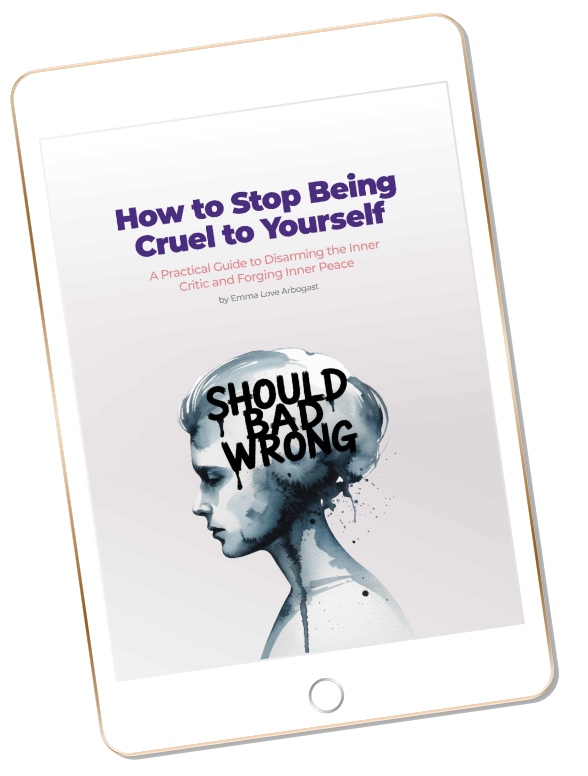Working With Regret
Regret is one of the hardest emotions we can feel. It can be a relief to realize that regret is a secondary emotion, and by addressing the primary feelings regret can be released.
The primary emotion in this case is grief.
Grief occurs when something is lost that cannot be regained. In the case of regret, what has been lost is an opportunity. It may be an opportunity to love, to live, to excel–to have an experience that is no longer possible.
While regret can be very difficult to feel and process, it is a much bigger tragedy to not deal with it. When grief in any form is not felt, then it sticks around and weighs on us. Regret that is not processed will stop you from seeing and letting yourself have the opportunities to live, love, be, and do that you actually still do have available to you.
Regret has a component of self-blame which keeps the grief stuck.
Regret is a mixture of grief and self-blame. While grief is difficult to feel by itself, it’s actually the self-blame which keeps us from fully feeling and releasing the pain of what we have lost.
The attraction of self-blame is the idea that if we blame ourselves, we will not repeat the same mistake. If we keep reminding ourselves of the pain we caused ourselves or others, and hold our own feet to the fire, that will protect us from future pain.
This logic is present in all self-blame, and it is completely false.
What really happens is that self-blame shuts us off from the natural flow of feeling and letting go that lets us live in the moment. By repeatedly reviewing the past, you shut out the present and therefore lose any opportunity to repair damage, to change patterns, and to create new experiences that you want. By not working through regret and learning from it, we inevitably create more of it.
Forgiveness is a spiritual process of repair.
Self-blame can make forgiveness hard. The good news is that once you start to repair the situation, you will feel better about yourself and it will not be so hard to forgive yourself.
If you do not feel you can forgive and let go, then take real action to repair any damage you regret causing. This includes damage to yourself.
Sometimes what we have done has hurt others, and to forgive ourselves we have to make amends first. So begin. Find the point of integrity in yourself and live from that point. You cannot change the past, but you can find something to do in the present that addresses the hurt you caused. You can learn to be a better person. You can contribute in ways that are meaningful.
Sometimes what we have done or not done has hurt only ourselves. This also requires amends. We need to honor our needs and our truth, and stop betraying ourselves. If your regret is your own inaction, then take action now.
Regret is a powerful teacher.
Sometimes spinning in self-blame becomes easier than changing. While it is painful, it can become familiar in time. If you are not willing to change, then you are not learning the lesson the regret is here to teach you. Regret is a powerful mirror that who you have been is not working. Listen to it; let it be your teacher and you will expand through it and experience healing.
How to heal regret: three components.
I find these don’t really go in order–it is an organic process.
Component 1: Feeling (without judgement or blame)
Things you can feel:
- Sadness
- Despair
- Anger
- Hurt
- Loneliness
- Longing
- anything else that comes up
Component 2: Acceptance
Things you can accept:
- Your own limitations.
- Others limitations.
- The limitations of time and space.
- That the past is irrevocably over.
- That you didn’t know better at the time.
Component 3: Action/Repair
Things you can do (this depends a lot on what your regret is about):
- Call someone and apologize or reconnect.
- Create a new habit/pattern.
- Journal or get help to recognize your part in things.
- Speak out (or write) about what happened.
- Make amends in some way.
- Start following new opportunities for love and life.

Free Ebook – How to Stop Being Cruel to Yourself
Permanently stop self-criticism, self-doubt, and comparing yourself to others.

Hi there! I’m Emma and I write about self-liberation. My writing is meant to share my process & inspire your own. If you want more frequent/current writing, visit my Substack Sparkly Dark.
If my writing has helped you, you can leave a tip at buymeacoffee.com, leave a comment below, learn more about me, or follow me on Instagram.
Thanks so much for reading! ~Emma

